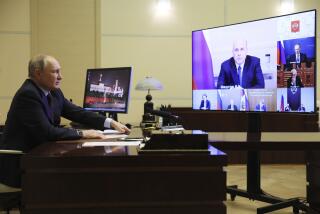Bush Took the Easy Way Out on Treaty Issue
- Share via
George W. Bush has gone into hiding on the nuclear test ban treaty, demonstrating a shocking failure of leadership. His terse, two-sentence dismissal of the treaty as “flawed” makes him complicitous with the Senate Republican leadership, which smashed 40 years of bipartisan arms control efforts by American presidents, including Bush’s own father.
Bush’s craven capitulation to the foreign policy tantrums of Sens. Trent Lott (R-Miss.) and Jesse Helms (R-N.C.) logically requires that Bush also jettison the U.S. nuclear-testing moratorium initiated in his father’s presidency in 1992. The GOP “victory” in the Senate will not be complete until the U.S. starts exploding some big ones under the Nevada desert. Why should we be the only ones who don’t test?
The 1992 moratorium on U.S. testing began when legislation written by former Oregon Republican Sen. Mark Hatfield was passed overwhelmingly by Congress and signed into law by President Bush. The assumption of that legislation--that we don’t need underground testing to guarantee the reliability of this nation’s nuclear deterrent--was scorned by the GOP leadership last week in shredding a treaty ratified by 26 nuclear-capable nations, including all of our Western allies.
Republicans opposed to the Comprehensive Test Ban Treaty also claimed that its provisions for more than 300 seismic monitoring outposts and on-site inspections were insufficient to prevent others from cheating by secretly testing nuclear weapons. Yet without a treaty, there is no mechanism for even proclaiming they ought not to test. Indeed, the Republican-dominated Senate, and all the announced Republican presidential candidates, have said to the world that nuclear testing is required for any nation’s security.
They’ve also said to voters that there’s an all-important divide between the foreign policy positions of the two parties. Al Gore and Bill Bradley were quick to reaffirm their support for the CTBT, making the Democrats the sole defenders of the bipartisan post-World War II consensus that the proliferation of nuclear weapons endangers life on this planet. The Republican leadership across the board instead has indicated that nuclear weapons are of such inconsequence as to be usable as a cheap political ploy.
If this is too harsh an assessment, then it remains for George W. to demonstrate how he would move, in the absence of a CTBT, to act against the threat of nuclear proliferation. He claims to recognize the seriousness of that threat, stating: “No American, Republican or Democrat, supports the spread of nuclear weapons. And if elected president, I will be committed to stopping proliferation.” Exactly how?
What’s his message to China, for example, which has signed but not yet ratified the CTBT? It’s accepted by all of our security agencies that China ceased testing nuclear weapons once President Clinton signed the treaty in 1996. For the Chinese to develop a triad of nuclear weapons--on land, in the air and on submarines--to threaten the U.S. with a credible first strike would necessitate decades of intense testing. Do we really want to encourage China or any other nation to go down that road?
The real danger of nuclear weapons proliferation is not limited to countries that might aim at developing a survivable first-strike. The power of nuclear weapons is such that even those with one or two can presume to play, if blackmail or terror is the game. The alarming spread of nuclear weapons technology in the aftermath of the Cold War is stoked by the delusional obsession of even some respectable international leaders, as recently demonstrated in India, where nuclear weapons are tokens of power to be worshiped in ways that defy rational calculation.
That’s the trap in which Bush and the Republican leadership now find themselves, having embraced the notion that these weapons require continual refinement through testing lest their inherent magic evaporate. That’s an awful message to send to less stable minds in a world in which the wherewithal of nuclear-weapons manufacture is alarmingly available. Leaks of expertise and material from the old Soviet Union are well-documented, and the stability of an arms race marked by implicit superpower understandings no longer applies.
If George W. is truly the “moderate” he says he is, he’ll quickly change course and back the tiny band of pro-arms-control Republican senators who promise another chance at ratifying the CTBT. If Bush knows how to improve this treaty, he should say how while also confirming his commitment to banning nuclear weapons testing--or be judged an opportunistic and dangerous hack.
More to Read
Get the L.A. Times Politics newsletter
Deeply reported insights into legislation, politics and policy from Sacramento, Washington and beyond. In your inbox twice per week.
You may occasionally receive promotional content from the Los Angeles Times.








